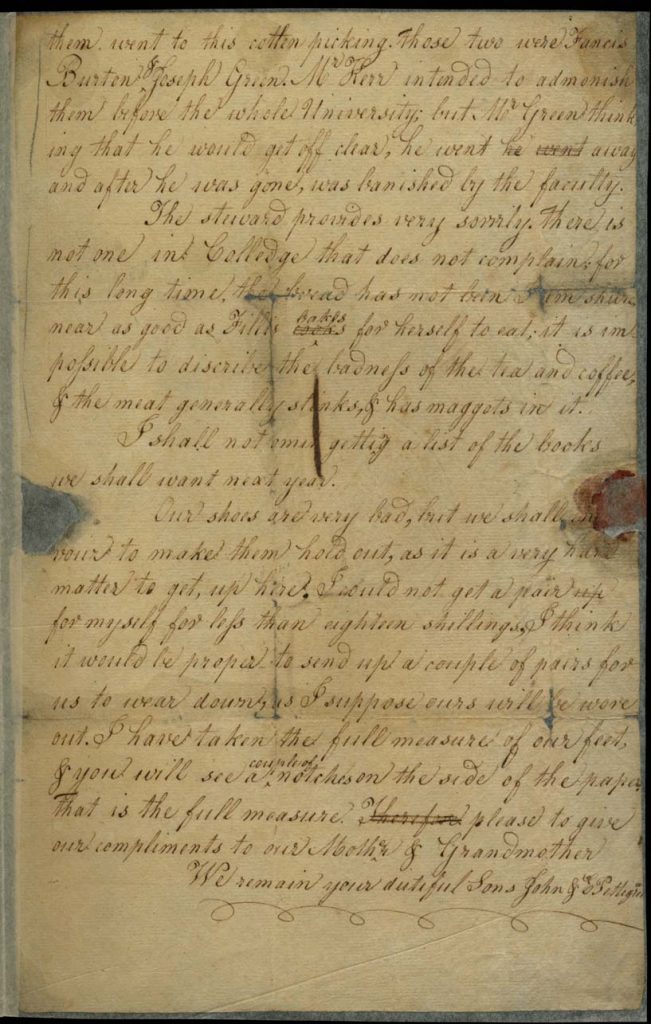
This is a personal letter titled “Letter from John and Ebenezer Pettigrew to Charles Pettigrew, October 3, 1795.” It is from a series titled “True and Candid Compositions: The Lives and Writings of Antebellum Students in the North Carolina” in the collection titled “Pettigrew Family Papers, Southern Historical Collection, University of North Carolina at Chapel Hill” found at Wilson Library with call number 592. Page 3 of 4.
This page is an excerpt from a four page letter from John and Ebenezer Pettigrew to their father, Charles Pettigrew (1). It describes the general life of students of the first class at the University of North Carolina at Chapel Hill, which also places them amongst the first students ever at a public university in the United States. Specifically, there is a passage about the food situation at the University. John and Ebenezer describe a repulsive atmosphere surrounding food at UNC Chapel Hill. In particular they declare the bread, milk, and tea as indescribably distasteful and the meat as having maggots in it. The two students put blame on the steward who is unnamed in the letter, but is well documented to be John “Buck” Taylor (2). It is also well documented that most students criticized Buck Taylor’s cooking such as a petition signed by nearly forty students declaring Taylor’s cooking was deplorable as to infringe upon their rights as students (3). However, certain emphasis must be placed on the type of students in the first class at UNC Chapel Hill. In the first class, they were mostly rich, white, young men trying to assert their manhood after leaving family estates where food was carefully and intimately prepared by slaves and servants (4). These food accounts are further explained by the low budget given to the steward, formed entirely from student tuition. Furthermore, Buck Taylor had to single-handedly balance a number of duties such as cleaning and repairing, along with food preparation for the dozens of students (5). All of this information gives context into the food situation at UNC Chapel Hill before the turn of the nineteenth century.
The University of North Carolina’s founding in the late 1700s is one of the most significant events in Chapel Hill—not only in the eighteenth century, but in its entire history. Therefore, a comment on food at the University is paramount to the food story of Chapel Hill in the 1700s. This also means this primary source is exceptionally significant because it is wholly different from sources before and after 1795. The food story in Chapel Hill prior to this letter was family oriented and community-based. After 1795, the town begins to grow and revolve around the University. Therefore, this source gives viewers a glimpse into the unique time period where Chapel Hill struggled to find sufficient food sources for its students and workers and failed to maintain quantities of fresh food.
Citations
(2) (5) University of North Carolina. “John Taylor’s Bond as Steward, November 16, 1794 [1795]: Electronic Edition.” Documenting the American South. 2004. Accessed October 08, 2018. https://docsouth.unc.edu/unc/unc06-08/unc06-08.html.
(3) University of North Carolina. “Petition of Students About Food at Steward’s Signed by Members of All Four Classes, [1809]: Electronic Edition.” Documenting the American South. 2004. Accessed October 08, 2018. https://docsouth.unc.edu/unc/unc06-154/unc06-154.html.
(1) University of North Carolina. “Pettigrew Family Papers, 1776-1926.” The Southern Historical Collection at the Louis Round Wilson Special Collections Library. 2005. Accessed October 08, 2018. https://finding-aids.lib.unc.edu/00592/.
(4) Williams, Timothy Joseph. Intellectual Manhood: University, Self, and Society in the Antebellum South. Chapel Hill, NC: University of North Carolina Press, 2015.
Page created by: Andrew Rento